Protecting your child’s teeth from decay and other problems is an important task for parents, and there’s lots of advice out there– good and bad. We all know cavities and dental problems can be both painful and costly, so working to actively avoid them for ourselves and our kids is something to approach with intention. Did you know that certain foods are great for dental health, while others can be particularly damaging? Our expert pediatric dentists at Tedford Family Dentistry in Ooltewah have compiled a list of best and worst foods for your child’s teeth, so you can stay informed and take a proactive approach to teaching your children healthy dental hygiene.

Sugary Drinks–
You guessed it! You may not be aware of just how teeth-damaging sugary drinks and sodas can be. The acids and sugars beverages like soft drinks and juices contain can really work against you causing tooth and gum damage. The sugar works as a fuel for bacteria in the mouth, turning it into an acid that eats away at tooth enamel, the outer protective layer of the teeth. Over time, this leads to tooth decay and– of course– cavities, so it’s important to try to limit your child’s intake of these types of drinks.
Sticky, Chewy Candy–
Chewy and sticky types of candy like caramels, taffy, and gummies tend to stick to the teeth for a long time. They also have a tendency to get stuck between the teeth or even leave a sugary residue behind that attacks and dissolves tooth enamel.
Chips, Pasta, & Bread–
This one may come as more of a surprise, but consuming lots of high-carb foods like chips, pasta, and bread can also have an adverse effect on tooth health. These starches are often made from white flour, which turns to simple sugars inside the body. These simple sugars can lead to tooth decay!

Milk, Cheese, & Yogurt–
Milk, cheese and yogurt are foods that are rich in calcium, phosphorus, and casein, all of which can help protect tooth enamel. Also, some of the nutrients found in milk can have a neutralizing effect on the acid that is produced by plaque bacteria in the mouth each time your child eats or drinks. So in short, not only is milk good for the bones, but it’s also great for the teeth!
Eggs–
An excellent source of protein, calcium, and vitamin D, eggs are great for oral health, as these minerals are key players in that arena. Vitamin D plays a large role in the absorption of calcium, and both of these vitamins help kids maintain strong and healthy teeth.
Apples, Carrots, & Celery–
Chewing apples, carrots, and other crunchy items that are high in fiber can actually scrub plaque off of your child’s teeth! These foods also make for healthy, easy-to-prepare snacks that are full of vitamins and minerals. Carrots and apples are also high in water content, and require a lot of chewing, which means more tooth-scrubbing action. An apple– who knew it was nature’s toothbrush!
Best and worst foods aside, it’s super important to teach your children healthy dental habits from the beginning. Show them how to properly brush their teeth, as well as floss them, and make sure they’re doing so twice a day for at least two minutes each time, per the ADA’s recommendation. If you need more advice or are looking for a great family dentist in the Chattanooga area, get in touch with Tedford Family Dentistry today!
When it comes to oral hygiene, there are many myths floating around that may cause confusion about what actually IS right, good for you, and necessary when it comes to your dental health. How often should you see your Chattanooga dentist? How many times a day should you brush your teeth and for how long? And then there’s flossing. What are the hard and fast rules about flossing your teeth? And what myths beg busting? Below are a few flossing myths your friends at Tedford Family Dentistry would like to debunk in effort to afford you some clarity on the subject.
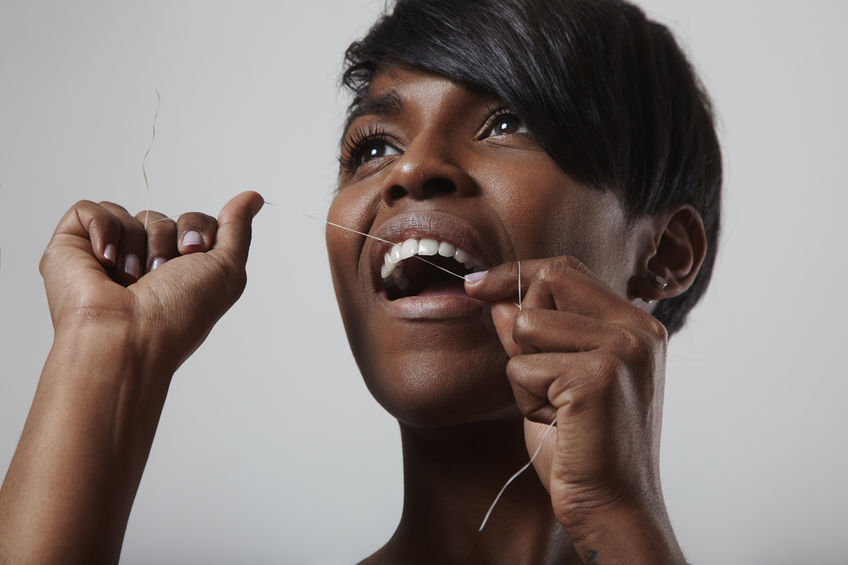
OK, no. It’s certainly true that flossing comes in handy when you have annoying food particles stuck between your teeth; however, that’s not the sole purpose of this dental care task. Flossing your teeth does help to remove hard-to-reach particles, germs, and plaque or tartar from spaces your toothbrush might not adequately reach. You should really floss your teeth at least once a day, and generally right before bed works best. That way your mouth is clean for sleep– no lurking cavity-causing food particles hanging around.
Wrong again, friends. It is important for children to also floss their teeth! For the same reasons it’s important for adults, children can also get food stuck between their teeth that if left behind, can cause decay or other issues. Younger children will need help with the task! Generally kids around age 6 or 7 can start handling the flossing on their own. Teach them the ways early to help build a foundation for healthy dental habits that will become long term.
Honestly, if flossing your teeth is causing you pain, you’ll need to get in touch with your Chattanooga dentist. Flossing might be uncomfortable if you’re not used to it or already in the habit of flossing your teeth regularly. If you have some minor discomfort, it’s probably because you have not been flossing as often as you should. Try to form the good habit of flossing daily, and the discomfort should subside. That said, pain is an indicator of a problem.
Flossing can be mildly awkward if you’re not accustomed to it, but it’s not difficult. It’s also something that takes next to no time at all once you get the technique right. The more you work it into your daily hygiene routine, the more adept you’ll become at accomplishing this critical task quickly. If you have a hard time reaching your very back molars, try Y-shaped floss picks or other interdental cleaners. In fact, interdental cleaners are great for cleaning properly around crowns and bridges, and generally hard-to-reach areas.
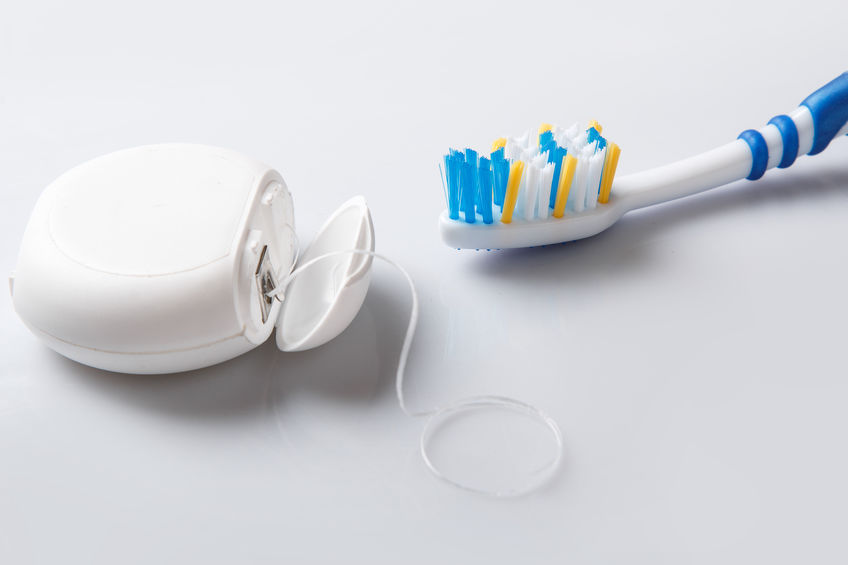
Wrong! There is a correct way to accomplish appropriate dental flossing, and if you’re not doing it correctly, you might be missing some food particles and plaque. Yikes! The most effective flossing method involves using roughly 18 inches of dental floss, winding it around the middle finger on each hand, and holding it between your thumbs and forefingers. Then you slide the floss up and down between two teeth, curving the floss around the top of each tooth, and gently flossing beneath the gumline to remove plaque, tartar, and left-behind food. When you move to clean between the next two teeth, shift the floss as well using a new area.
It’s important to make sure you have accurate information when it comes to your dental health. You’ve only got one set of permanent teeth, and it’s so critical to take every step to care for them well– from regular dental cleanings and exams to making healthy food and drink choices to brushing and proper flossing practices. We hope you found this list of overturned flossing myths informative and helpful. If you have questions or need to set up an appointment, get in touch with our Tedford Family Dentistry staff today! We’d love to help. P.S. Floss your teeth!
When it comes to dentistry for children, you may be totally lost as a new parent. In fact, parents have a million things to think about, learn, and frankly figure out how to do right, but knowing what your child needs and when can be tricky sometimes. Especially as a brand new parent, there are a great deal of unknowns– but when it comes to your child’s dental health, there doesn’t have to be. Our staff at Tedford Family Dentistry in Ooltewah is here to guide you as you work to ensure your child or children have the healthiest teeth possible, and the best pediatric dental care Chattanooga has to offer, and the knowledge and tools necessary to properly care for their teeth for the long haul.
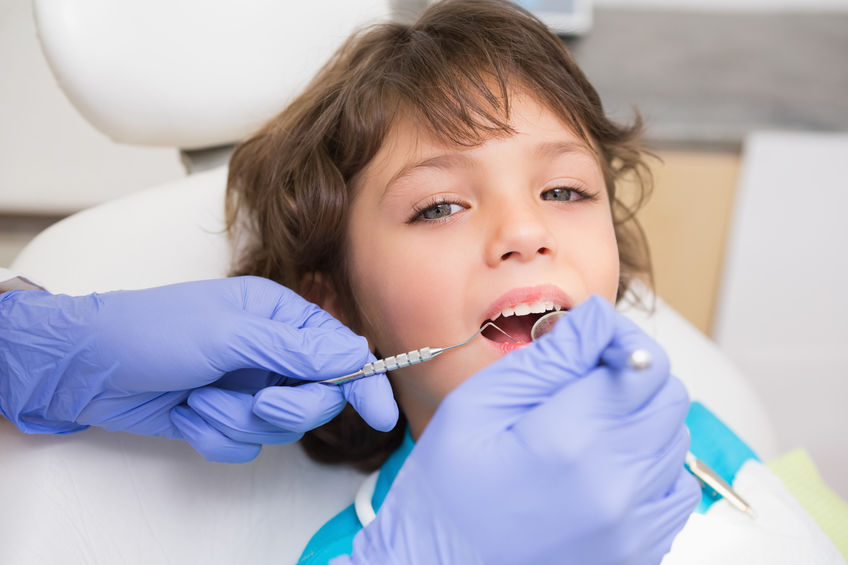
Great dental care and habits should start early. How early? Well, as soon as your baby starts having teeth come in, you should begin to take care of them. By age one, your child should probably see a pediatric dentist. These initial visits are more about establishing comfort with seeing a dentist, and so that parents can receive helpful information about how to best care for their baby’s first teeth. By age two, it’s recommended that your child start with the twice a year dental cleanings and check-ups. Between ages four and six, your child’s dentist will start taking x-rays to ensure your child doesn’t have any cavities or potential issues that need to be addressed.
Seeing your pediatric dentist regularly is important for dental health, but it will also help your child get comfortable about the whole dentist office experience. Choosing a dentist you trust (cough, Tedford, cough) is a great first step in a lifetime of great dental health, and once a relationship is established, you can enjoy many years of great dental care in a space where you feel at ease. Build a relationship with a dental provider you trust, and that dentist will get to know you or your child, your teeth, and your history. This holistic, big-picture understanding will also help ensure you receive the best possible dental care every time. From losing and getting new teeth to possible cavities to sealants and even orthodontic referrals, your pediatric dentist will be with you each step of the way guiding your treatment plans.
After you find a dentist and set up a schedule for routine dental cleanings and exams, you’ve done the hardest part and laid your groundwork. Then, all that’s left to do is teach your kids healthy dental habits and hygiene! As always, a lead-by-example approach is a great place to start. Make sure your children witness you practicing what you preach. Make sure they see you brushing and flossing everyday– okay, they don’t have to literally watch you do this every single day, but make it clear to them that you’re doing what you expect them to do too. Make sure you’re teaching them proper brushing techniques, and that they are brushing for the recommended 2 minutes.
You’ll also want to make sure your kids don’t do things like grazing or drinking too many sugary drinks. These things can be detrimental to tooth health, working like a near-constant attack on enamel. Establish meal times that start and end, and encourage your children to drink water throughout the day to help keep their mouths as healthy as possible.
If you’re looking for a family dentist, we’d love for you to consider becoming a part of the Tedford family. We have proudly served patients in the Ooltewah, Cleveland, and Chattanooga areas for years, and we’d love to take care of you and your family. Exceptional family dental care, customer service, and a pleasant environment make us a great choice for any family. Get in touch today, and let us help you on your path to the healthiest possible smile.
As the end of the year approaches, we all do a little soul searching, setting intentions for the new year. It’s always nice to have a clean slate– a fresh start of sorts. The first of the year is the perfect time, if there ever was one, to resolve yourself to taking better care of your teeth! Maintaining healthy gums and healthy teeth is a really lovely goal to work towards on your own or maybe with your whole family.

The thing about New Year's resolutions is you’ve got to be realistic, and do whatever you can to set yourself up for success. One great way to achieve this is to work toward a common goal with your whole family. You and your partner and kids can all work toward healthy gums and teeth together! Make it a goal. Here are a few tips to help you stay the course with a resolution for better dental health.
Accountability- Hold each other accountable! Ask your kids if they brushed and flossed each morning and before bed. Remind your spouse to swish with a mouthwash to help kill bacteria and promote a healthier mouth. You can even ask your dentist at Tedford Family Dentistry in Chattanooga to recommend a toothpaste and mouthwash combination that’s best for you and your family.
Talk about it!- Talking about your resolution to practice healthy dental habits will only reinforce your goal, both in your own mind and with those around you. Being vocal about it will help encourage and motivate you, and your family as well, if they are taking this dental health journey with you!
Track your progress- This is especially helpful with children! Make your kids a chart and use stickers to track how well they’re doing with teeth brushing and flossing. That visual representation of effort is always encouraging and motivating. You could even work out a reward system to treat them for a job well done.
Involve your dentist!- Ask your dentist at Tedford how to best maintain healthy gums and teeth. Ask for recommendations about what steps you can take that are specific to your teeth and your personal goals, and always stay on schedule with regular dental cleanings and exams.
Go above and beyond brushing and flossing- There’s more to a healthy mouth than just the obvious basic daily care habits. Avoid sipping on sodas and other beverages (other than water) throughout the day, as these items can eat away at tooth enamel making it more susceptible to decay. Also don’t graze on food. Eat regular meals and maybe a snack or two a day, but in the interim, give your teeth a break.
All of us at Tedford Family Dentistry hope these tips are encouraging to you, and that you’ll consider a resolution related to your dental health. We also hope you and yours have a wonderful holiday season, and ring the new year in right, but what’s more is we hope you reach your personal goals you set for yourself. If better dental health is a goal of yours for 2020, just know we are here cheering you on, and happy to help in any way we can. Cheers to a happy, healthy new year, and hopefully happy, healthy gums and teeth.
Perhaps once upon a time, all you wanted for Christmas was your two front teeth– but now as an adult, maybe there’s still room for you to love your own smile more? It’s amazing the level of confidence you can find in having a beautiful, white smile. If that’s something you aspire to, our expert staff at Tedford Family Dentistry wants to help.
At our office in Ooltewah TN, we offer all kinds of cosmetic dentistry services, and there’s never been a better time to take steps toward your best smile– just in time for the holidays. At our office, we can help with dental implants, dental veneers, teeth whitening for your brightest smile, cosmetic fillings, and contouring. No matter what condition your teeth are in, our dental staff is here to help restore your smile, whether that’s with something as simple as a whitening treatment, or something as involved as implants.
Sometimes to accommodate tooth loss, your dentist will recommend dental implants. These artificial root replacements are surgically positioned into the jawbone beneath the gum line with the use of metal posts or frames. This process allows for the secure positioning of replacement teeth, and generally results in a more healthy and youthful looking smile.
Pros and Cons of Dental Implants
Pros:
Cons:

Dental veneers are thin pieces of porcelain bonded to the teeth to recreate a natural, beautiful smile. They also behave like actual teeth, boasting strength and resilience much like natural tooth enamel. Dental veneers can be used to fix chipped or broken teeth, as well as uneven, worn down, or misaligned teeth, creating a more aesthetically pleasing smile.
Pros and Cons of Dental Veneers
Pros:
Cons:
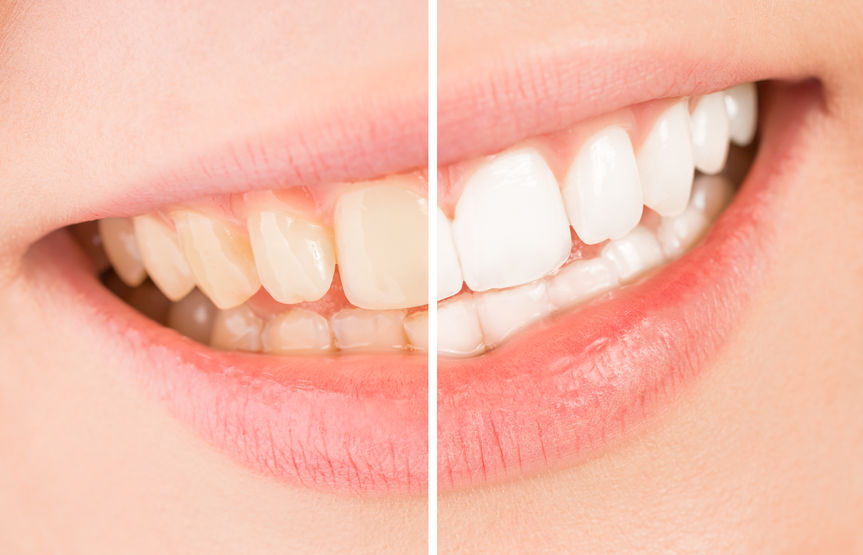
Let’s face it. Some of us don’t have teeth as white as we’d like. Lots of things can cause teeth to discolor and stain– smoking, drinking coffee, tea, and red wine, aging, trauma, and of course, poor oral hygiene. Some of us just naturally have teeth of a darker shade, but whitening is always an option. At Tedford, we can help you achieve your whitest, brightest smile!
Pros and Cons of Teeth Whitening
Pros:
Cons:
At Tedford Family Dentistry, we will work to ensure trays fit properly to avoid these potential issues. With the holidays coming up, maybe you should treat yourself to the smile you’ve always wanted. If you are considering cosmetic dental procedures, we hope you’ll consult with our dentists at Tedford Family Dentistry. We are here to answer any questions you might have about potential treatments that can help you achieve your best possible smile. Get in touch today, and start the process.

It’s candy season, folks, and it all kicks off with Halloween. Late October ushers in the several-month-long stretch of holiday parties at school, at the office, with friends, and with family– and the common thread running through these get togethers? Abounding treats. Halloween is the first of the candy-laden holidays, and every kid you know is soon to have a pillowcase full of sugary confections they will indulge in for weeks to come. First Halloween, followed by Thanksgiving and Christmas. The treats will be in full supply all the way through the New Year, and the near constant intake of sugar can really take its toll on teeth. For this reason, we’ve put together a comprehensive list of how you can prevent cavities and tooth decay from sneaking up on you throughout the holiday season.
You guessed it. The most important way to keep teeth healthy and stay on top of cavity prevention is good, old-fashioned brushing and flossing. You and your kids should be brushing for 2 minutes, twice daily and flossing before bed anyway, but during the holidays with all the cookies and candy, it’s even more imperative to be diligent about these habits. Your friends at Tedford Family Dentistry also suggest, at least for older kids, that incorporating a cavity-fighting mouthwash can help ensure bits of sweet treats don’t take up residence in those hard-to-reach spots and cause decay.
 2- Drink A Lot of Water
2- Drink A Lot of WaterWater intake is key to wellness for so many reasons, but it’s also imperative for maintaining a healthy mouth. Not only does water help loosen and remove food particles and bacteria on and around the teeth, but it also has a neutralizing effect on plaque acids while encouraging the flow of healthy saliva. Each swig of water acts as a quick rinse for the mouth and teeth, and is an all-around healthier alternative to holiday drinks like soda or punch. Plus, the fluoride in drinking water is nature’s best cavity fighter. Enjoy the festive beverages in moderation, but be mindful of the important role water plays in keeping your teeth in great shape.
It may seem like a good idea to slowly munch on cookies and holiday candy, spacing it all out over time; however, this is not the case. Think about it this way– basically everything you eat or drink nourishes the bacteria present in your mouth. Then, said bacteria produces acid which attacks the enamel on your teeth, depleting the minerals that comprise them. It takes about 20 to 30 minutes for the acid levels to neutralize or return to normal levels. Therefore, when you slowly graze on sugary food and drink, you prolong the amount of time your teeth are subjected to the effects of these harmful acids. For this reason, it’s much better for you and your children to partake in your snacks and treats at one time, then give your teeth a needed break.
Between the sticky holiday candy, caramel corn, and pie, you should sneak in some healthy snacks too! Remember that crunchy vegetables like carrot sticks and celery are not only good for your body, but also help clean off the surfaces of your teeth. Interestingly enough, cheese is also a good choice! Especially if you’re enjoying an alcoholic beverage or two at a holiday party, calcium in the cheese can help neutralize acids from the drinks while also strengthening your teeth. Sneak these snacks onto your kids’ party plates as well, instilling good, balanced habits and healthy choices.
Though the last few months of the year tend to be the busiest, don’t skip your regular trips to the dentist! This is probably the most important time of year for staying on top of exams and cleanings. Catch issues early, and use preventative measures like flouride treatments to avoid issues that can worsen over time if not treated. Enjoy the fun holiday season with all their tricks, treats, gifts, and get togethers– but not at the expense of proper oral care. The staff at Tedford is here to help you with all your family dental care needs, so don’t hesitate to reach out to us!
Start ’em early! It’s never too soon to start imparting to your children the importance of good oral hygiene. Experts say as soon as your baby starts getting teeth in, you should begin cleaning them, and here at Tedford Family Dentistry we fully subscribe to this belief. You can start by wiping your baby’s teeth clean with a soft cloth and warm water. When your baby reaches the 18 months mark, you can begin brushing your baby’s teeth with a pea-sized amount of low-fluoride toothpaste. As they grow, they can begin taking more and more ownership of the task, but for a good while, they will need a lot of help and supervision.
Establishing these good oral health habits out the gate will help reduce the risk of tooth decay and cavities in baby teeth, of course, but getting into an early routine of regular brushing will also likely carry over into adulthood. Make it a priority to help your young children brush their teeth at least twice a day, and increase the chance that those good habits will stick.
When your little ones are young, it’s helpful to find ways to make brushing fun. Let them choose their own toothbrush at the store with colors or characters they love. Brush your teeth with your child, or even let them brush your teeth for fun. Use a timer so it feels like a game, but also reminds them to brush for the right amount of time, ensuring they target each area of the mouth for a thorough cleaning.
It’s no surprise that kids who learn great brushing and flossing habits early in life experience far less dental issues in adulthood. Laying that foundation is imperative. By age 5, nearly 50% of children have had one or more cavities! A lot of parents buy into the belief that decay in baby teeth doesn’t matter since those teeth will eventually be lost and replaced with permanent ones; however, this is a gross misconception. Decay in baby teeth can, in fact, have an adverse effect on the health of adult teeth, and can lead to dental issues later in life. This is why it’s so important to be proactive about preventative care from the get-go, caring for your baby’s teeth as soon as they begin to come in.
Every pediatric dentist would agree that teaching your kids to actually brush their teeth with regularity is only part of the job. You also need to teach them the proper techniques to be completely successful. Most parents are familiar with this scenario. Your child puts a glob of toothpaste on a toothbrush, half of which finds its way into the sink (aka NOT into your child’s mouth), and he or she spends maybe 15 seconds lathering it up before a quick spit, and they’re on their merry way. Not gonna cut it. You can help your child learn how to do a better job by demonstrating the best way. Brush your teeth at the same time, showing your child the best brushing techniques. This way they can also get a better feel for how much time they should be spending on the task.
The American Dental Association recommends a full two minutes of brushing. Several seconds of aggressive brushing can actually be harmful and cause distress to teeth and gums. This is a great case of slow and steady wins the race. Teach your kids to take their time, concentrating on all surfaces of their teeth, as well as the tongue and gums. Lots of bacteria live here, and it takes diligence to combat those germs that can cause bad breath as well as gingivitis.
Leading by example will be key in teaching your children these healthy oral care habits, but you should also ensure they receive the recommended preventive care from an expert pediatric dentist. That’s where we come in! At Tedford Family and Pediatric Dentistry in Ooltewah, TN, we take a preventative approach and believe trips to the dentist can be fun. We go to great lengths to ensure our young patients have positive experiences each time they come in to see us, and we are in it for the long haul. Whether the patient is one year old, or ninety, we believe in providing the best possible care, encouraging great habits, and keeping your pearlies looking and feeling their very best.
At Tedford Family Dentistry, we have been helping residents of Ooltewah and the surrounding areas maintain healthy mouths for years. While we offer services that help to fix dental issues once they have already happened, we feel that it is more important for our patients to understand that the benefits of maintaining a preventative dental routine in order to decrease the number of dental issues that can arise during their lifetime. If you don’t take care of your teeth and properly manage your oral health, you may find yourself forking over thousands of dollars in restorative dental care. Did you know that a full mouth reconstruction can cost between $45,000 and $80,000? By practicing preventive dentistry, you can safeguard yourself from these exorbitant dental costs. In today’s blog post, we are going to go over some of the steps that patients can take to make sure that they are practicing proper preventative dental care.
Preventive dentistry emphasizes the importance of ongoing hygiene procedures and daily practices to prevent tooth decay and other dental diseases and conditions. This is achieved by patients making sure that their at-home oral care is properly addressing the daily needs of their gums as teeth while also combining regular visits to the dentist in order to make sure that issues that are harder to address at home (such as plaque and tartar build up) are taken care of before they become major issues.
The American Dental Association (ADA) recommends a minimum of two dental checkups each year for professional cleaning and management of any developing conditions. Following this recommendation can help your dentist stop dental disease in its earliest stages, protecting your smile and limiting your expense as it relates to your oral health.
Preventive oral care strategies include a number of in-office and home care activities. Some of these activities include:
At-home oral hygiene: The most important prevention technique is brushing and flossing at least twice a day (or after every meal) to remove dental plaque. If plaque is not removed, it can build up and produce dental tartar, a hardened, sticky substance with acid-producing bacteria that can cause tooth decay and lead to gum disease. Trust us, it is better to prevent tartar from accumulating than letting it take hold. Once the tartar has taken hold, it can only be removed by a dental professional.
Diet: A balanced diet is essential to overall oral health. Foods laden with sugars and carbohydrates feed the bacteria that produce dental plaque, while calcium-poor diets increase your chances of developing gum (periodontal) disease and jaw deterioration. We’re not saying that you have to be a health food fanatic but you do need to make an effort to eat food that is going to help your teeth rather than harm them.
Fluoride use: Fluoride strengthens teeth and prevents tooth decay. While you can visit the dentist for a fluoride treatment, it is not always necessary to get the recommended amount of fluoride each year. Fluoride has been added to tap water in most areas of the country so when you brush your teeth twice a day, you’re also receiving a fluoride treatment at the same time!
Regular dental visits: Visiting the dentist on a regular basis is one of the most important things a person can do in order to make sure that their oral health stays as good as possible. Because most dental conditions are painless at first, a person may not notice something is wrong until it gets to the point where pain occurs. For best results, schedule regular dental check-ups every six months. During this checkup, your dentist will remove any plaque or tartar that has built up, check for cavities, and generally make sure that your teeth, gums, and mouth are healthy. Additionally, your dentist should perform screenings for oral cancer to make sure that no abnormal tissue growth is happening on the gums or in the mouth.
Sealants: Sealants are thin composite coatings placed on the chewing surfaces of back permanent teeth. Sealants are most commonly placed on children’s permanent teeth when they develop, however, adults can also benefit from sealant treatment.
X-rays: X-rays enable dentists to look for signs of dental problems that are not visible to the naked eye, such as cavities between teeth and problems below the gum line. Even though your teeth may look perfectly fine at a glance, x-rays ensure that no problems exist below the gumline.
Avoid smoking and drinking: Chewing tobacco, smoking, and drinking have all been linked to problems surrounding oral health. These substances work to weaken the enamel of the teeth which leads to discoloration, cavities, tooth decay, and even oral cancer.
If you have any more questions about preventative dentistry or you would like to schedule an appointment at our Ooltewah office, please reach out to us today by giving us a call at 423.238.8887 or filling out our contact form.
If you ask most people how they feel about flossing, you are likely to be greeted with answers that are less than favorable. It seems that across the board, most people don’t enjoy flossing and even fewer people actually take the time to floss on a weekly, let alone daily, basis. Why is flossing such a tough sell for people? Mostly because it is time-consuming and can also lead to some uncomfortable feelings in the gums afterward. Despite the reluctance of the average person when it comes to flossing, we wanted to take some time in today’s blog post to go over the many reasons that flossing is one of the most important things a person can do in order to maintain good oral hygiene and reduce that amount of problems associated with bad oral health. Keep reading below to learn more!
In a world where it’s hard to believe anything that we are told at face value, many people may be wondering if flossing is actually worth it. After all, people tend to brush their teeth every day; shouldn’t that be enough? While brushing your teeth is an important component in maintaining good oral health, it is only the basest of activities that need to be completed in order to make sure that your pearly whites stay healthy. You see, brushing is great but it really only tackles the problems that are on the most easily accessible areas of a person’s teeth. Bacteria in the mouth are adept at finding nooks and crannies that are hard to reach, allowing them to take root and enjoy the plethora of sugars that find their way into our mouths every single day. When you floss, you are reaching areas of your mouth that a toothbrush just simply can’t. Cleaning out the areas in between teeth is one of the best ways to fight plaque build-up, which can lead to all sorts of nasty things, and improve the overall health of your mouth.
We can tell you all day about the benefits of flossing but we also want you to understand what can happen if you choose not to floss on a regular basis. When you don’t floss, you are at risk for two major dental issues: gingivitis and cavities between your teeth. Gingivitis is a common and mild form of gum disease that presents itself as irritation, redness, and swelling of the gum area that surrounds the base of a person’s teeth. If ignored, gingivitis can lead to a much more serious gum disease known as periodontitis and, eventually, tooth loss. In addition to gingivitis, people who do not floss are more likely to get cavities in between their teeth. If you have ever had a cavity, you know that they are not fun to deal with. A cavity in between the teeth is even worse. While flossing will not completely eliminate the risk of gingivitis and cavities, it goes a long way in protecting your mouth from these uncomfortable and potentially harmful oral maladies.
Ideally, a person would floss every single day. However, as dental professionals, we know that this does not always happen. Flossing at least once every few days, in addition to brushing your teeth at least twice a day, can go a long way in making sure that your mouth stays as healthy as possible. We’ve found that many people find it easier to get into a flossing routine if they purchase disposable, one-time-use flossers. These tools are easier to use than traditional dental floss and can be kept in a small container directly on the bathroom sink. If you’re looking to incorporate a flossing regimen into your daily oral hygiene routine, we suggest that you floss every time that you brush. Even though it takes a few extra minutes, we promise that the health benefits will be worth it.
If you have any more questions about oral hygiene or you need to schedule an appointment to have your teeth cleaned, please reach out to us at Tedford Family Dentistry today and schedule an appointment. We have been serving patients in the Ooltewah area for years and we would love to help you make sure that your mouth stays as healthy as humanly possible.
In our Ooltewah Dentist Office, we see patients who suffer from regular teeth grinding, also known as “bruxism.” Since stress is a major contributor to teeth grinding, we are dedicating this month’s post to suggestions to help you lower your stress levels.

Pain in the jaw from clenching teeth too tightly is bad enough, but stress can trigger many negative responses in our bodies, including headaches, high blood pressure, tense muscles, high blood sugar, heartburn, depression, and a weakened immune system. Here are a few ideas for getting your stress under control.
We’ve all felt stress and wished we could escape the pressures of modern life to experience complete relaxation like the people in those bath power commercials from the 70s and 80s, pleading, “Calgon, take me away…” The home is usually a sanctuary for taking a break from stressors, but this doesn’t work if the pressure comes from a growing credit card bill or a baby that won’t stop crying.
You don’t have to keep up the façade of being Superman or Wonder Woman around the house. If other members of the household aren’t pitching in, speak up and let them know ways they can help. Talk to your spouse or a child about cutting back or getting a job if their spending is making it more challenging to manage debt. Don’t be afraid to accept help from a support system of family and friends, especially if you are the primary caregiver for a child or an aging parent. Keep a stress diary to track what triggers episodes of clenching teeth and other symptoms.
It’s stressful knowing you’ve put on weight, aren’t getting enough activity, and not giving your body the nutrition it needs to perform at a normal level. You don’t have to hit the gym hard to experience changes. Simply walking around the neighborhood more often can make you feel more energetic and sleep better. Moderating your intake of stimulants like caffeine, nicotine, alcohol, and sugary foods can also help the nerves.
Whether it is a daily prayer or meditation, taking a short pause to look inward can lead to a feeling of gratitude and inner calm. Try mindfulness to shift your focus away from negative thoughts and anxiety. Yoga has been found to increase body and breath awareness, lowering cortisol levels, blood pressure, and heart rate. Soothing music and visits to the woods can also be very calming.
We’re all in favor of you showing off that beautiful smile. If watching a comedy takes your mind off stressors, make a date night of it. Light a scented candle if the aromas are pleasurable. Relish in social connections, including your church family, and take opportunities to cuddle, hug, and kiss when appropriate. A hobby like gardening may be enjoyable to you rather than hard work. A massage can alleviate physical pain from tense muscles. The companionship of a pet can also reduce stress, assuming your dog or cat behaves.
It’s easy to feel overwhelmed if you don’t know where to start. Sometimes getting a grip on stress is as simple as wrapping your head around what needs to get done to change things for the better. With an action plan, you can focus on doing something specific each day that removes or improves a stressful thing from your life, better manage your time, and stop procrastinating.
If you get riled up reading political posts on Facebook, don’t jump into debating someone whose views differ from your own. If something bothers you, limit your exposure to it. If coming to a dentist’s office for a regular cleaning fills you with dread, DO keep the appointment, but definitely let us know so we can find ways to alleviate those feelings when you arrive at our Ooltewah Dentist Office.
Easier said than done if you stress manifests as insomnia. As much as possible, give your brain time to calm down before going to bed and try to go to sleep at roughly the same time each day.
For many people, stress is synonymous with work: Making sure we get to the office on time, meet deadlines, say the right things to the boss. Earning a living doesn’t have to mean feeling miserable, though.
Easy enough, right? If your company offers paid vacation, it’s because it’s been proven that you’ll be more productive when you return from a bout of leisure. If you can’t afford a 2-week cruise to the Bahamas, find ways to do fun things closer to home. If you are feeling sick, your body needs time to rest so it can recover more quickly.
It’s easy to take on too much when we want to be liked at work and fear missed opportunities as a result, but you can find nice ways of letting people down gently and communicating when you are overburdened.
If you employ these strategies and feel relaxed yet still experience tenderness in jaw muscles, your dentist may use X-rays to detect temporomandibular joint (TMJ) disorders or other dental problems. A sleep study might assess whether episodes of teeth grinding are due to sleep apnea or another sleeping disorder. Splints and mouth guards that fit over the upper and lower teeth keep them separated to avoid damage from clenching and grinding. Another treatment for severe bruxism is Botox injections. In severe cases affecting a patient’s ability to chew properly, reshaping of a tooth or use of crowns may be needed to repair the damage.
These are a few of the common strategies people use to reduce their stress levels and address teeth clenching or grinding. Consult with a doctor if you have a medical condition or before starting new exercise routines. Consider visiting a licensed therapist or counselor if the bruxism is related to anxiety. Please feel free to ask Dr. Keith Tedford for ways to treat bruxism or other dental conditions. You can schedule an appointment at Tedford Family Dentistry by calling (423) 238-8887.
Photo: © Studio Grand Web / 123RF Stock Photo
Blog © 2019 Tedford Family Dentistry: Tedford Keith DDS | Ooltewah TN 37363
 We all want a more youthful appearance, especially as we approach middle-age and worry about getting passed over for jobs in favor of younger candidates or fear that we are losing our sex appeal. Millions of Americans fight to hide signs of the natural aging process with injections to tighten the skin and products to conceal gray hairs. One positive impact of cosmetic dentistry performed at our Ooltewah TN dental office is a more youthful appearance. For those with teeth in good condition, teeth whitening or dental veneers can give the illusion of a more youthful smile. For others who’ve lost teeth over the years, dental implants surgically positioned into the jawbone create a similar effect.
We all want a more youthful appearance, especially as we approach middle-age and worry about getting passed over for jobs in favor of younger candidates or fear that we are losing our sex appeal. Millions of Americans fight to hide signs of the natural aging process with injections to tighten the skin and products to conceal gray hairs. One positive impact of cosmetic dentistry performed at our Ooltewah TN dental office is a more youthful appearance. For those with teeth in good condition, teeth whitening or dental veneers can give the illusion of a more youthful smile. For others who’ve lost teeth over the years, dental implants surgically positioned into the jawbone create a similar effect.
Think back to when you were a younger person, perhaps in your twenties, with beautiful white teeth freshly aligned from wearing braces in your teens. Wouldn’t it be great to have those pearly whites again? Like the circles inside a tree marking the passage of time, the shade of the enamel on our teeth can reveal our age, even for those who’ve taken great care of their teeth, brushing and flossing daily and scheduling regular cleanings twice a year as recommended. It’s simply inevitable for teeth to stain as a result of aging, combined with tobacco use, years of drinking colas or coffees, eating acidic foods, or possibly as a result of some trauma experienced along the way. Teeth whitening at our Ooltewah cosmetic dentistry office lightens teeth and helps to decrease this discoloration. Another alternative is applying thin pieces of porcelain veneers to add strength and mask natural teeth that are chipped, stained, or worn-down over time.
Whitening is the cheapest and easiest way to make a smile look younger, says Bruce Seidner, a fellow at the Academy of General Dentistry. “However, not everyone can have their teeth successfully whitened. Sometimes a person's enamel or damage to the teeth make it difficult to achieve lasting results. In those cases, a veneer covering the tooth may be a better option,” Seidner told US News & World Report.
When simple teeth whitening and veneers fail to improve the look of teeth, dental implants become the next option if someone wants to avoid dentures, which can slip and not feel as natural. It’s important for surgically implanted teeth to match the tone of the surrounding teeth, if any, in order to appear natural. Missing teeth can cause a more “sunken-in” appearance and add wrinkles to the face. The effects of gum disease building over generations can impact the look of our smile as well and may require grafting to restore receded gums. It’s comforting to know that age doesn’t disqualify us from having a better smile.
No two people age in exactly the same way. Regardless of the condition of the mouth, we can always look better with some effort. With cosmetic dental procedures performed in Tedford Family Dentistry’s Ooltewah TN office, you can enjoy and embrace your age with a more confident, youthful smile that helps you compete for that job or win the attention of that special someone.
Dr. Keith Tedford can consult with patients who want to improve the appearance of their teeth and achieve a more youthful look. To meet with him and our staff, call us at (423) 238-8887 or stop by our office at 9380 Bradmore Lane, Suite 108, in Ooltewah TN to schedule an appointment with Dr. Tedford.
Photo: © GStockStudio / 123RF Stock Photo
Blog © 2018 Tedford Family Dentistry: Tedford Keith DDS | Ooltewah TN 37363
If you experience frequent jaw pain, headaches, migraine, or a painful sensation around your ear, you may have an inflamed TMJ, or temporomandibular joint. You might hear clicking or popping while chewing or talking if this condition affects you. In this blog, we’ll talk about the symptoms and possible causes of TMJ pain, how Dr. Tedford diagnoses the disorders, and how to treat TMJ and the jaw damage causing the painful symptoms.
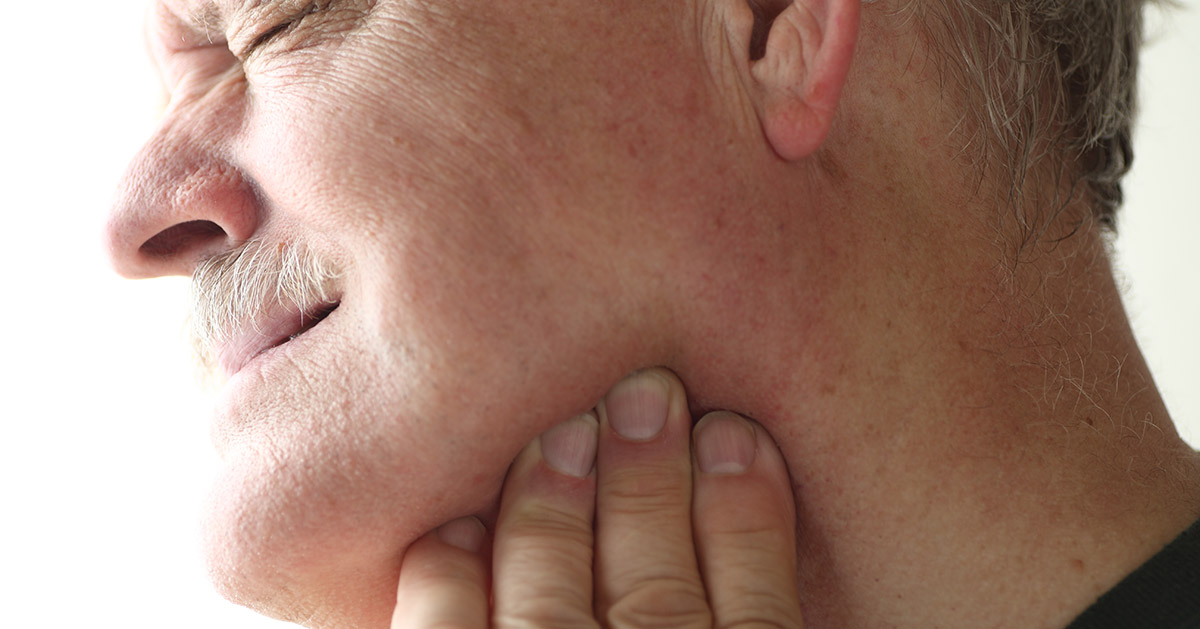 If you’re under a lot of stress, you may constantly clench or grind your teeth, which eventually damages the joint connecting the lower jaw to the bone on the side of the skull. You may not even be aware that you are doing this during the day in stressful situations or while asleep at night. This damage from putting pressure on the jaw usually rears its ugly head as the pain of headaches.
If you’re under a lot of stress, you may constantly clench or grind your teeth, which eventually damages the joint connecting the lower jaw to the bone on the side of the skull. You may not even be aware that you are doing this during the day in stressful situations or while asleep at night. This damage from putting pressure on the jaw usually rears its ugly head as the pain of headaches.
You can treat the condition by focusing on relaxation techniques, stretching exercises to ease the strain on muscles while exhaling and by using mouth guards to prevent jaw clenching. Pain relievers like ibuprofen or acetaminophen can help to manage the pain but their use should be limited to avoid possible side-effects like gastrointestinal bleeding.
Of course, you can experience pain in your jaw even if you’re a relatively relaxed person. TMJ pain can also result from arthritis as the surface of bones wears away, the connecting joint ligament becomes inflamed, or as a consequence of gum disease, neuropathic nerve pain, vascular pain, sinus conditions, or a condition called osteomyelitis that is essentially an infection in the bones and surrounding tissues. Whatever the cause, the result is suffering that lowers the patient’s quality of life. By the time TMJ is diagnosed, a lot of damage may already be done. That’s where Tedford Family Dentistry comes in to offer solutions from those patients suffering from TMJ/TMD disorders in the Ooltewah TN, Collegedale TN, greater Chattanooga, and Cleveland TN communities.
Of course, the occasional headache may have another cause, but if TMJ is suspected, Dr. Keith Tedford discusses symptoms and examines the jaw to observe the range of motion, identify specific sites of pain or discomfort, and listen as the mouth is opened or closed. Dental X-rays may be needed to inspect the bones and reveal problems. To arrange a visit to discuss your jaw pain, call (423) 238-8887. We can set up a time to visit our dental office at 9380 Bradmore Lane, Suite 108, Ooltewah TN 37363.
In addition to the relaxation techniques and mouth guard described above, the symptoms of TMJ disorders may be relieved with prescribed pain relievers and anti-inflammatories, low doses of antidepressants like amitriptyline that can sometimes be effective for TMJ, or short-term use of muscle relaxants. As mentioned on our dedicated page about TMJ/TMD Disorders, surgical procedures to treat the condition are typically only employed only after other treatments have failed.
The first step is to attempt the at-home treatments we recommend, then Dr. Tedford can repair the jaw damage for long-term dental care.
To arrange a visit to discuss your jaw pain with Dr. Keith Tedford, call (423) 238-8887 or email This email address is being protected from spambots. You need JavaScript enabled to view it.. This can be the year that he offers TMJ treatments that work for our patients in the Chattanooga, Ooltewah, Collegedale and Cleveland communities.
For more information on Treating TMJ:
https://medlineplus.gov/magazine/issues/winter10/articles/winter10pg15a.html
https://www.webmd.com/oral-health/guide/temporomandibular-disorders-tmd
https://www.medicinenet.com/temporomandibular_joint_syndrome_tmj/article.htm
https://www.healthline.com/health/tmj-exercises
Photo: © Nebari / 123RF Stock Photo
Blog © 2019 Tedford Family Dentistry: Tedford Keith DDS | Ooltewah TN 37363
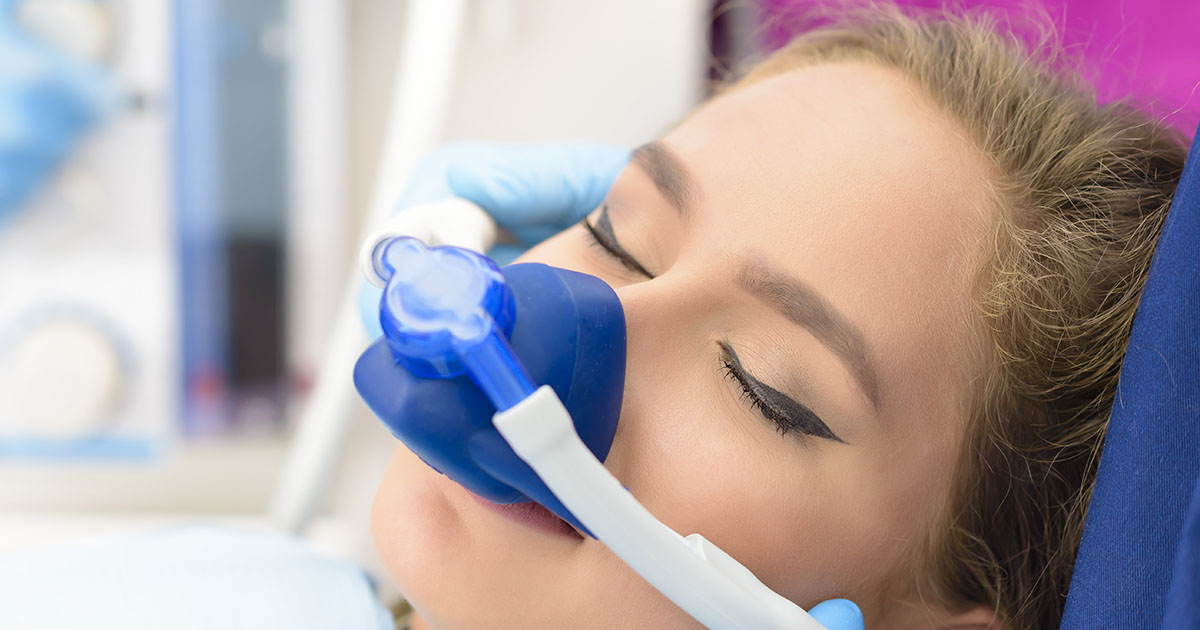 To ease anxiety during dental procedures, a mild form of sedation called Nitrous Oxide can be used. We are happy to explain the procedure, why it relaxes patients, and how it makes them feel.
To ease anxiety during dental procedures, a mild form of sedation called Nitrous Oxide can be used. We are happy to explain the procedure, why it relaxes patients, and how it makes them feel.
Among the benefits of its use are the reduction or elimination of anxiety in patients, enhancing patient communication and cooperation, raising the pain reaction threshold, making longer appointments more tolerable, aiding in the treatment of mentally or physically disabled patients, reduction of gagging, and general sedation.
Nitrous Oxide, commonly known as “laughing gas,” is a colorless, almost odorless gas, first discovered in 1772 by the English scientist and clergyman Joseph Priestley (who was also famous for being the first to isolate other important gases such as oxygen, carbon monoxide, carbon dioxide, ammonia, and sulfur dioxide). He hoped it would serve as a preserving agent, but with no success. Humphry Davy of the Pneumatic Institute in Bristol, England, experimented with the physiological properties of the gas, such as its effects upon respiration. He noted that it appeared “capable of destroying physical pain” and might serve as an anesthetic agent in minor surgical procedures.
Before widespread use for that purpose was adopted, “laughing gas” was primarily used recreationally, sometimes at carnivals where the public would pay to inhale the gas, laughing and acting silly until the euphoric effect wore off.
During one of these public nitrous oxide exhibitions, a local dentist named Dr. Horace Wells watched with interest as a man injured his leg while staggering into some nearby benches, then went back to his seat, unaware of his injury until the effects wore off. The next day, Dr. Wells inhaled the nitrous while another local dentist extracted one of his molars. Experiencing no pain during the procedure, he declared that a dental and medical painkiller was born, replacing the far more dangerous (and explosive) ether as an anesthetic. Ironically, Dr. Wells would later be given the accolade of discovering anesthesia, but he was shunned while demonstrating with a tooth extraction at Harvard Medical School in Boston after the patient expressed some discomfort. Never mind that the patient would have experienced excruciating pain without the use of the nitrous!
More than a century later, dentists now use Nitrous Oxide as a mild sedative and analgesic. It offers some degree of painkilling ability while reducing anxiety that patients may have toward dental treatment.
Use of laughing gas is not always effective because it requires the patient to breathe through the nose while his or her mouth is open to allow access to the teeth and gums.
Dentists today use laughing gas because it is safe and effective. Its use is mostly limited to professionals because it is a compressed liquefied gas and asphyxiation risk. The euphoria felt during use causes short-term decreases in mental performances and manual dexterity, as well as spatial and temporal disorientation. In other words, you’re fine inhaling it while comfortably seated during a dental procedure, but you don’t want to run a marathon or try to drive a racecar while huffing the stuff.
Nitrous oxide also depletes vitamin B12 levels, but this is generally not an issue when administered during a dental procedure. Nitrous oxide does have a negative environmental impact on the greenhouse effect, but this is primarily from natural emission from bacteria in soils and oceans, as well as the burning of fossil fuels. We also have to prevent room air contamination due to the occupational risks associated with prolonged exposure to the gas.
Like any substance producing euphoric states, laughing gas is susceptible to abuse. Many states have laws regulating the possession, sale, and distribution of nitrous oxide. Such laws usually ban distribution to minors or limit the amount of nitrous oxide that may be sold without a special license. Nitrous oxide/oxygen must be administered only by appropriately licensed individuals, or under the direct supervision thereof, according to state law. The practitioner responsible for the treatment of the patient and/or the administration of analgesic/anxiolytic agents must be trained in the use of such agents and techniques and appropriate emergency response.
According to the American Academy of Pediatric Dentistry, nitrous oxide exhibits a superior safety profile with no recorded fatalities or cases of serious morbidity when used within recommended concentrations. Nausea and vomiting are the most common adverse effects, seen in 0.5 percent of patients.
When reviewing whether your child is a suitable candidate for nitrous use, medical history is assessed. It’s important to tell us about:
Nitrous Oxide use has an excellent safety record precisely because it is used by trained personnel on carefully selected patients with appropriate equipment. The reason we ask questions during a procedure is to monitor a patient’s level of consciousness and to make sure the respiratory rate is suitable for normal breathing.
It's called "laughing gas" for a good reason. Reactions to dental anesthesia have been the stuff of memes. “David After Dentist” is the name of a YouTube video uploaded in January 2009 featuring a young boy’s reaction after a May 2008 dentist appointment. The clip is known for receiving more than 3 million views in three days, becoming YouTube's second most watched video of that year. After his surgery was completed, the youngster asked deep questions including "is this real life?" and "Is this going to be forever?" It was even spoofed in a Star Wars parody. A heavier form of sedation than nitrous oxide was likely used in this instance.
At the end of most procedures, we administer 100 percent oxygen once the nitrous oxide has been discontinued. This usually results in patients feeling like their normal selves again before leaving our office. We encourage patients to communicate about any residual disorientation and to wait additional time in the waiting room before attempting to drive if there are residual effects felt from the laughing gas. Also, maybe make sure the person taking you home promises not to record you on video and share it with the world unless you are a really good sport about that sort of thing.
Let us know if you or your child may benefit from laughing gas during a dental procedure. We are happy to discuss specifics at our office by calling (423) 238-8887 or scheduling an appointment to visit our family dentistry office located in Ooltewah, TN. We also serve Collegedale TN, Chattanooga TN and Cleveland TN communities.
Photo: © One Blink / 123RF Stock Photo
Blog © 2018 Tedford Family Dentistry: Tedford Keith DDS Ooltewah TN 37363